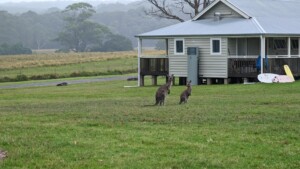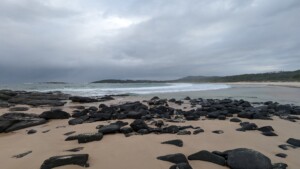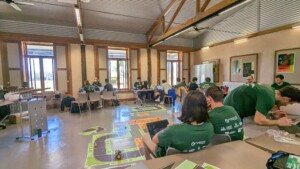POSTED: 22 Feb, 2023
The Robotics Vision Summer School (RVSS) is an annual event that brings together researchers and students from all over the world to learn about the latest developments in vision-based control methods for robotics. The program features a series of lectures, tutorials, and hands-on projects designed to teach participants the fundamentals of robot vision, spatial awareness, and visual learning.
The program is an excellent opportunity for students to network with other researchers, learn from leading experts in the field, and gain valuable hands-on experience with cutting-edge technology. Two of our PhD researchers, Jagannatha Pyaraka and Nadimul Haque attended the 2023 RVSS and shared some highlights from their experiences.
What were some of the topics covered during the Robotic Vision Summer School, and which were the most interesting to you?
Jagannatha: The most interesting topics was the vision & deep learning. Deep dive on “How the way we see is different from what a robot looks and perceives” and “how to train a robot to finish a task done from that vision” were very valuable.
Nadimul: RVSS covered mostly vision based control methods. There were segments on spatial awareness, visual learning, reinforcement learning, and robot vision. To me, I felt that robot vision that covered camera calibration, visual servoing were the most interesting topics because they were quite new to me. Visual learning was also very interesting because it covered a lot of theoretical and philosophical ideas regarding AI as well.
What were some of the hands-on activities or projects that you worked on during the summer school, and what did you learn from them?
Jagannatha: On day 2 we were given a RC car and brief about the outcome to be delivered by the end of week for a final competition. The task was to present an autonomous driving car that detects turns and steers accordingly completing a lap in shortest time possible. As I was completely new to deep learning, this kind of gave me a brief idea on robot data training, prediction and optimisation.
Nadimul: During the summer school, we had to do a project that involved controlling a robot with visual data. Although the problem itself was trivial, it highlighted the importance of spatial awareness and uncertainty modelling, rather than simply learning from raw visual data.
What were some of the highlights of the program for you?
Jagannatha: Learning (Deep dive sessions*): One of the key highlights is the opportunity to learning from domain experts. Insight on latest advances in robotic vision, including techniques and technologies to improve robot perception and decision making.
Hands-on-experience: Allowing us to work on RC car has given an invaluable experience in terms of implementing our learning to real-world setting.
Networking: During breaks and other free time I was able to network with fellow researchers, field experts which helped me to build relations that can be beneficial in near future. I did discuss my research with them and got to know a list of important things to consider while solving my research problem.
Exposure to research: I was able to get good exposure and relate with common problems faced in current research. This was a good opportunity to learn about on-going projects and emerging trends.
Nadimul: The highlights of the program are surely, the deep dive lectures given by Richard Hartey, Hanna Kurniawati and Miaomiao Liu. An hour and a half of their talks didn’t only comprise of their current and recent works, but showed a glimpse of their thought process, which I think is much, much more important for an HDR student to grasp. Of course, the lectures given by Peter Corke, Simon Lucey and others were also quite interesting. Being close to such influential people and hearing from them not only as tutors, but also as humans, was a great privilege.
What did you learn that you think will be most useful in your future work or studies?
Jagannatha: The lectures /deep dives on below topics are most useful for my future work are:
- Deep learning – Various algorithms for decision making, pattern recognition, optimisation
- Object recognition and tracking – Detecting and tracking important objects in given environment
- Fusion of sensors
- Spatial awareness
- Human robot interaction – Better ways in which robots can communicate and interact with humans which helps in collaborative tasks
Nadimul: I think the biggest thing I learnt from RVSS is to take things step by step and find the time to sit back even in the busiest time, to think about whatever idea I might have in a broader perspective. The lectures, especially the deep dives helped me to gather my thoughts and ideas about my PhD project, which I think will shape my future works.
Apart from the amazing program, what else did you get up to?
Jagannatha: Almost all the evenings we had fun activities – which included networking with fellow researchers, bon-fire, going to the beach, game night, panel discussion – In which we were allowed to ask any questions to the experts such as their experience, thoughts about future developments, failures, and career advice.
Nadimul: RVSS hosted students from different universities, both from Australia and abroad. Most of them were more experienced, and in a more advanced stage in their PhDs (6-10 months in). It was a pleasure to talk and learn about their journeys, how they fixed their PhD topic and ideas etc. It was a great experience in meeting people from different cultures and backgrounds and learn from them as well.
Recent News
Celebrating the Robotics & Advanced Manufacturing Centre at TAFE Queensland!
On 17th June 2025, our Centre was part of the official opening of the Robotics and Advanced Manufacturing Centre (RAMC) at TAFE Queensland Eagle Farm ...
Meet our E.P.I.C. Researcher, Sheila Sutjipto
Sheila Sutjipto is a Postdoctoral Research Fellow in the Biomimic Program where her research explores physical human–robot interaction (pHRI). She ...
Fireside Chat Series Continues with B&R Enclosures
The Australian Cobotics Centre is thrilled to continue its Fireside Chat series with B&R Enclosures, one of our valued industry partners. These i ...


